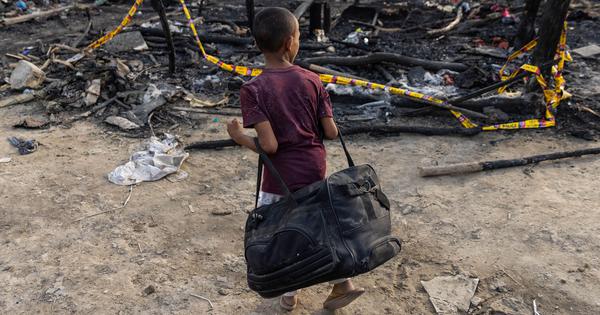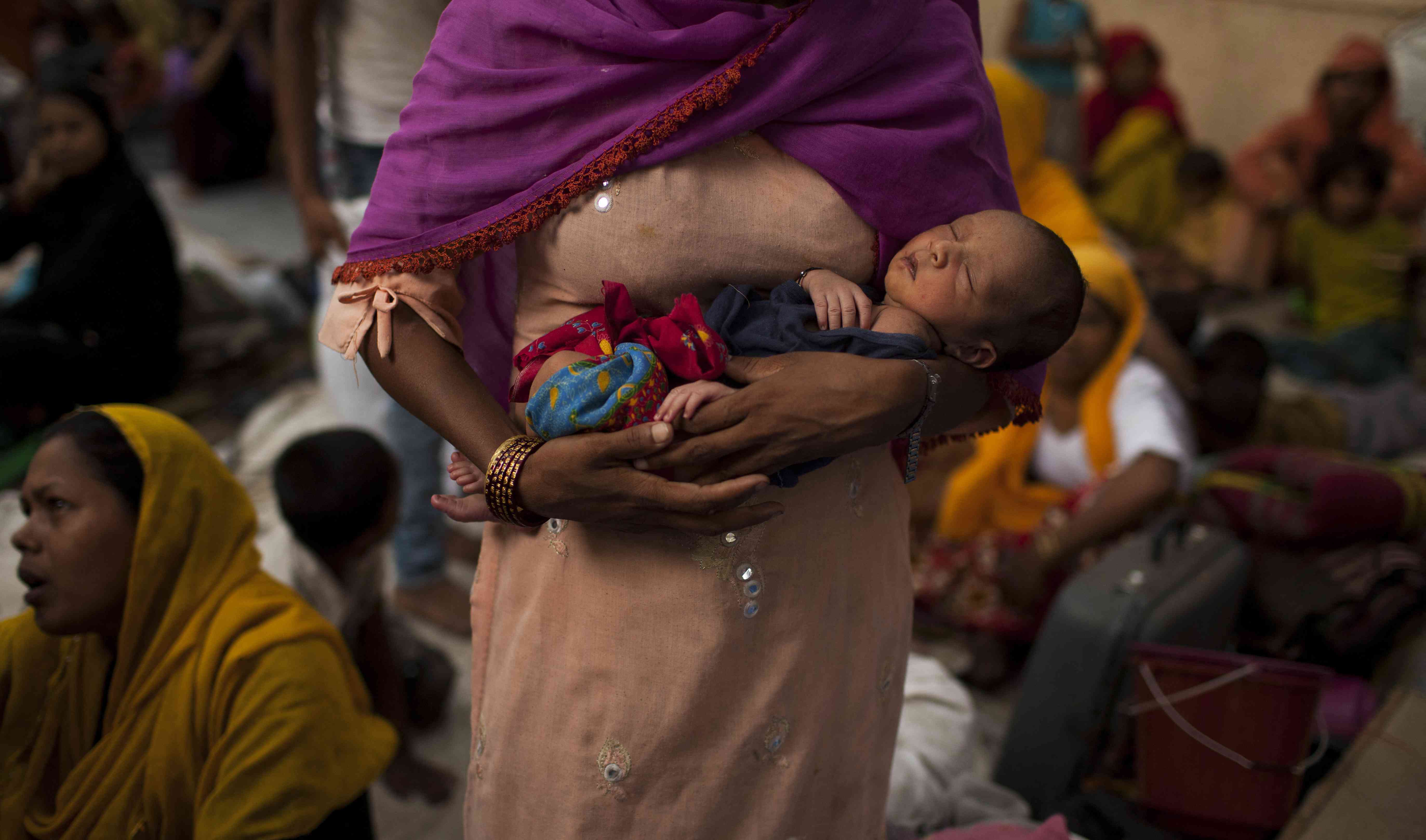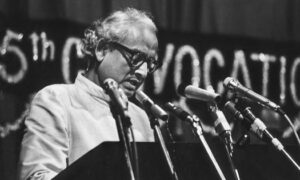
It was May 6, 2025.
That fateful night, India was to launch missile strikes, sending airforce planes deep into Pakistan to target terror infrastructure, in response to the terrorist killings of 26 tourists on April 22 in Pahalgam in Kashmir.
In the national capital city of Delhi, more than 40 Rohingya refugees, including old and ailing women and men, were rounded up by the police. Their families were told that their biometrics were being checked and they would soon return.
But they disappeared. For three days there was no word from them. Their families were sick with worry. No officials would answer their queries.
Then three days later, a phone call came from their loved ones. The families gathered anxiously. The story they told was beyond belief.
They were first flown in an Indian Air Force plane to the Andaman Islands, then bundled into a naval boat. As one of them reported in a call that one of them recorded, “they bound our hands, our hands bled and [they] did not let us move our heads from up and down… They [then] threw us into the sea, they gave each of us a life jacket, with which we swam and reached the seashore…” Reaching land, to their horror they found themselves in Myanmar, the land from where the Rohingya had fled years earlier to escape genocide.
Two veteran human rights lawyers, Prashant Bhushan and Colin Gonsalves, stood before the Supreme Court a week later, on May 16, urging the urgent return of the deported Rohingyas, an end to future deportations and massive reparations.
But the judges of India’s highest court were unconvinced and unmoved. Justices Surya Kant and N Kotiswar Singh described the claims in the petition as “fanciful”, “a beautifully crafted story”, with “absolutely no material in support of the vague, evasive and sweeping statements made”. Justice Kant scolded, “When the country is going through a difficult time, you come out with such fanciful ideas”.
They refused any relief for the desperate petitioners.
In the weeks that followed, however, investigative reporters from Article 14 and BBC Hindi confirmed the truth of the stunning story that the Supreme Court had judged to be “fanciful” and “beautifully crafted”.
Thomas Andrews, United Nations Special Rapporteur on the situation of human rights in Myanmar, described the deportation as “unconscionable, unacceptable acts”. “I am deeply concerned”, he said, “by what appears to be a blatant disregard for the lives and safety of those who require international protection. Such cruel actions would be an affront to human decency and represent a serious violation of the principle of non-refoulment, a fundamental tenet of international law that prohibits states from returning individuals to a territory where they face threats to their lives or freedom.”
But for the refugees trapped in Myanmar, and their loved ones back in India, nothing changed.
I met three young men whose families continue to hide in the forests of Myanmar trapped between life and death, amidst the bloody war between the military junta and resistance forces, and endangered further by criminal gangs.
They were eager to tell me their story. They wanted the world to know.
I was, however, anxious for their safety. I told them I would not disclose their identity as I did not want to throw them into even greater danger than what they already were enduring.
The young man whose story I recount here replied, “Why do you want to save me? I am already dead. Those who I love in the world are all lost to me. There seems little chance that they will return alive. Then why should I live? Tell the world my name. ”
I still refuse to disclose his name.
These are his words:
Just like in India, in my Myanmar, people of different faiths and communities lived together with goodwill – Muslims, Christians, Hindus and Buddhists. It was a beautiful, peaceful place.
But a time came when Buddhist militants attacked Rohingya Muslims, Christians and Hindus. They first attacked the Jamaat mosque. The Muslims also fought back. The Buddhist military then started burning our homes and shrines, and killing us. I remember all these years later how they even tore a baby out of her mother’s lap and killed her with a bamboo arrow. I saw this with my own eyes.
I was seven years old then. I am 24 now. This would have been around the year 2007.
My father was a big farmer. We owned a lot of land, pineapple orchards and vegetable fields. He used to sell his produce in Bangladesh and India.
My parents sent us out to study the Quran in our village madrassa. If times had remained normal, I would have gone on to study like a village boy like in India in our village government school, where children of all communities would have studied together.
But now suddenly all of this was lost. The military snatched away our citizenship papers and ordered that as non-citizens we could no longer study in the school. The Buddhist militants burnt down our home. The military confiscated our farms and plantations. As non-citizens, they said, we had no right to own property.
Matters finally came to a head one day when the militants killed my grandmother. My father feared that we all would be next. Therefore, in the dead of the night, we secretly escaped – my grandfather, my parents and we three young brothers. We trudged over the hills, hiding during the day, trekking through the nights, until we entered Bangladesh.
Bangladesh shares a long border with our home state Rakhine. The Bangladeshi military and police did not stop us at the border. But still it was a hazardous crossing, because the Myanmar military would fire missiles across the border to retaliate against the escape of tens of thousands of Rohingya like our family. They were warning the Bangladesh government to not give us shelter.
We found our way to Cox Bazaar, which houses the largest number of Rohingya refugees in the world in a massive camp. We lived there under a plastic tent for two months. But conditions in the relief camp were very hard. The monsoon floods came, and flood waters from the swollen river submerged the refugee camp. Many people fell sick and died.
My parents then decided that we would move to India. We had heard glowing stories about India, about its insaniyat, its humanity.
How wrong we were!
I don’t remember where we entered India. I was too small a child. Maybe Siliguri, maybe Tripura. What I do have memories of is my grandfather and parents wading neck-deep through river waters to cross on to the other side of the border in the darkness of the night. My father carried me on his shoulders.
The Indian soldiers on the Indian border did not stop us. They asked us which country we were from. My father explained that we were Rohingya from Myanmar escaping a genocide. He paid them money. If we were Bangladeshi, they would have stopped us. But hearing that we were refugees, the soldiers did take money from us but then helped us. That is why I still say, Indians are good people.
There were other Rohingya as well who had escaped like us. We were a large group. We took a train first to Delhi, and then in this bewildering large city of strangers, the elders in our group discussed the next steps. Some among them did speak halting Hindi. People advised them that many Rohingya had taken shelter in Jammu, and that is where our elders decided that we should travel.
We arrived at a large camp in Jammu, and began life again there under a tent. Fellow inmates of the camp guided us to apply for a refugee card to the UN High Commission of Refugees. We got the card, but learned that the refugee card does not give us any rights from the Indian government. Some Rohingya were given long-term visas by the previous Congress government. But we did not get these. Maybe this was because my parents knew no Hindi and could not communicate with the Indian authorities. These long-term visas have completely been stopped in the Modi regime.
The government should be more compassionate. My parents tried to explain to the authorities that we do not intend to become Indian citizens. That we live in hope even today that the day will dawn when peace is restored in Myanmar and we can return to our homes. That Myanmar is where our hearts still lie.
But after all we are human beings. We have to live somewhere in the meanwhile. I still say that the Indian people are good. But what the government has done to us is very wrong.
We lived in the camp in Jammu for about seven months. The UN organised some food rations in the camp for some months, then these were halted. The Jammu camp was hardly fit for human life. It was nearly as bad as Cox Bazaar. We consulted with the UN authorities who advised us to shift to Delhi.
And so the family took the train back to Delhi. In Delhi we moved into the Rohingya camp in Madanpur Khader. It is more hellish than a slum. Living from day to day has been very hard all of these years. Many families survive by collecting waste. I started working very early. Sometimes I stood in a labour chowk and was picked up for construction work. Sometimes, I got temporary employment in housekeeping in a hotel. From 2020, I worked as a casual labourer paving tiles. Work was not regular, but when I did get work I earned Rs 400 a day.
Twice our homes of plastic and thatch were burned down, and each time we built again. We are convinced that these fires are not accidents. The first time, in 2016, some RSS men came to the camp and threatened us, warning us of dire consequences if we did not vacate the land and return to our country. With them were also some officials.
We pleaded with them, describing to them our desperation, explaining that we had no choices. Just two days after they came, the first fire destroyed the camp.
The Station House Officer of the Madanpur Khader Police Station helped us with tents. We slowly rebuilt our slum homes. These were more flimsy than earlier, because we had no money. And then a few years later, in 2020, once again there was a fire. And one more we had to build again, houses that were even more feeble.
The UNHCR staff advised us to move out of the slum and rent a room. It was difficult for us to pay the rent, but we agreed that it was safer to move to a pucca room. But the police came and misled the landlord, so he asked us to vacate. And we were back in the slum.
As the years passed, my mother lost her mind. My elder brother became a Maulana. My father was diagnosed with diabetes and on many days, he found it hard to labour. My brother earned a few thousand rupees running tuition classes for the slum children. In this way, life went on.
My mother insisted that I should marry. She said there would be someone to look after the house and the elders. In 2020, my parents got me married. The girl was not from our community. She was destitute. She had no one in the world. I don’t know where she came from. She would go from house to house begging for food and help. My parents felt sorry for her, and decided I should marry her. They did not seek my consent. I did not even meet her before our nikah.
But I am happy with her.

I started working even harder, overtime until 9 at night. My wife got pregnant, but the first child died in her belly. The challenge was how to get her to deliver the dead baby. Our problem is that we cannot get a bed in a government hospital. They ask for an Aadhaar card which we don’t have. But I had saved a little money, putting some aside from what I earned each month after giving money to my parents and wife. This saved her, because I was able to take her to a private hospital in Malviya Nagar. They charged me Rs 5,500 to take out the dead child from her body.
However, the state administration became visibly more hostile to us Rohingya people after Modi rose to power. One evening in 2020 when I was returning from work, suddenly some policemen caught me and took me to the Kalindi Kunj police station. As I waited at the police station, they also brought in my parents, my wife, my brother, and bundled us all into a van. We were frightened and asked, where are you taking us? Some policemen taunted us, saying we are sending you back to your country. But others said, don’t worry, we are taking you to the UNHCR office in Vasant Vihar.
But as they drove us, I could make out that we were not heading to Vasant Vihar. At some point, they stopped the van, and asked the locals, “Where is the place where they lock up Bengalis?” And in this way, we arrived at the detention centre at Inderlok. The detention centre is guarded by the Nagaland police. They are good people.
Our whole family was pushed into the camp and the doors locked behind us. There were some 60 other people there, all Rohingya like us. The women and men were separated. My wife was three-months pregnant, and I was very anxious about her. Then we all lined up for food. The food was terrible, like poison – danger khana. How can I describe it? You know the smell that rises from the solution with which punctured tyres are repaired? The food had that smell. Five years later, I can still feel the taste of that food and I feel nauseous.
After food, it was time for the evening namaz. We all gathered to pray, but suddenly I fell to the ground unconscious. When my senses returned, I found I was in a hospital.
After four days or so, I was sent back to the camp. The same food, and it only got worse. I would often faint after eating.
My pregnant wife desperately wanted to eat boiled eggs. I told her – we are locked up in a place in which we cannot see the daylight outside. How can I get you eggs? But there was a kind woman guard. She would bring her eggs to eat. Of course, we had no money to pay her, but she was kind.
The Naga guards were also good people. But the home ministry staff were terrible. They were rough and kept using swear words for us. They were mostly Haryanvi, so we did not understand the meaning of all their abuses.
One day my wife also fainted in the bathroom. I carried her out and again we were sent to the hospital. They chained her to the bed and me to the chair. The doctor said she is pregnant, at least free her from the chains, but the authorities did not agree.
The UNHCR officials pleaded with the Home Ministry officials who agreed finally to release my wife and me so she could safely deliver her child. But we refused to leave the detention centre unless they also released my parents. The officials reasoned with us; they said our child would die if we did not leave the detention centre, but we were firm. Finally, the authorities relented and the whole family was set free. We had until then spent four months in incarceration.
Months later our child was born. We could not afford a hospital, so she delivered the child in our slum home.
But after that the authorities returned to pick up my parents and took them back into the detention centre. My parents were very unwell. My mother just stopped speaking; she would just hold your hand like this. I wrote application after application – I have two sack-full of petitions, but to no avail. They would not even allow us to meet them. They kept them in detention for three years, until 2023.
After my release, I got work as an ice-cream vendor. I got 15% commission on my sales. When my parents came out of the detention centre, I would spend a lot of my earnings for their medical treatment.
My elder brother finally married six months earlier. My wife delivered twins.
Two years passed, and then May 2025 came upon us, the angry aftermath of the terror attack in Pahalgam in Kashmir. Our lives were to be broken forever.
It was May 6. That night the planes flew into Pakistan. The police came to where we live, and rounded up my father, my brother and his wife, my unmarried younger brother, and many others from our neighbourhood. They panicked, but the authorities said, “Don’t worry, we are only taking you to the detention centre to record your biometrics”. But they had already taken everyone’s biometrics. “No, there are some mistakes”. However, how could there be mistakes in the biometrics of every person?
I was in hospital with my wife who had suffered another miscarriage. She could barely walk. I had called my brother a day earlier, and asked him to leave my mother at the hospital to look after our three small children.
A policewoman phoned and asked where I was, and my mother and wife. I told her that we were in a hospital. She asked me for the address. An hour later, a police team swooped down at the hospital. The policemen called for the doctor and harshly rebuked him. “Who dare you treat these ghuspaithiya? Don’t you know that they are Bangladeshis, Pakistanis? Discharge them immediately”. The doctor morosely signed the discharge papers. The police then dragged my mother and wife and my children into a van. They thrashed me as they pulled me also into the van.
At the police station, the police officials confabulated for a while, then they decided to let my wife and me go, because of our very small children. But they roughly hauled my mother back into the van and drove her away. With her they lugged away other Rohingya in the police station, including children. When I saw my mother and children being dragged like animals, I could not bear it. I almost stopped breathing.
I then desperately called my brother. He told me that they are not checking our biometrics. They had snatched the phones of all the people in the van. But my brother had managed to hide his phone in such a place in his body that they could not find it.
I think, he said, they are sending us back to Myanmar.
He told me to urgently call the UNHCR officials and the human rights lawyers that had helped them in the past. “Tell them to come immediately, otherwise we will be deported”. I did as he said, but was shocked when the UNHCR officials told me to cooperate and not interfere with what was happening. They then stopped answering my calls. No lawyer came for them.
Next, my brother sent me a disconsolate recording that they were being driven to Ghaziabad, to the Hindon Airport which is an Indian Airforce base. The men and women had been packed into different buses. There were two police jeeps in front, two at the back of the convoy.
This was the last I heard from him.
For three days we waited desperately for news from them, but there was silence. No phone worked, there was no news.
Then, on May 9, we got a call from some fishermen in Myanmar. We all crowded around. I spoke to my brother, and learned from him their story.
In Hindon, they were all bundled into an air-force plane. They were in chains, their hands pulled back and handcuffed, their eyes blindfolded. The men were made to pull down their trousers, to check if they were Hindu or Muslim. Many were Christian Rohingya, but the soldiers beat them more, asking why they chose to convert to Christianity and not Hinduism. The uniformed men in the plane beat them with the butts of their guns, and taunted them, “You are responsible for the terror killings in Pahalgam”, they said. “You are trying to occupy our country”.
After a harrowing journey, the plane landed in Port Blair in the Andaman Islands. They were then packed in a van and driven to a port, where they spotted a naval ship. Inside the ship, again the chains, handcuffs and blindfolds.
They were terrified. The officials in military fatigues told them, “You cannot live in India. We can take you to Myanmar or Indonesia. Where would you like to go?” They opted of course for Indonesia; Myanmar would mean returning to a situation in which they were non-citizens with a high chance of being jailed or killed.
The blindfolds and chains were restored, and the ship set sail. My brother told me that the ropes were tied so tightly on their wrists that many of them bled. They were commanded by the naval sailors to sit with their heads lowered. If they raised their heads, they would be badly beaten. The sailors kept taunting them, “You are the people who killed our people in Pahalgam. You are all terrorists”. They mocked them, “Even if we throw you into the ocean, there will be no one to speak out for you, because you are people with no nation”.
After some hours – they cannot recall how long – the blindfolds and chains came off. Instead they were made to wear life jackets, and one by one they were thrown off the ship into the sea waters. “Like trash from a trash can they were thrown”, the young man who spoke with me lamented. “Like they were trash”.
The coast line was visible, and they desperately swam ashore as the naval ship departed. Some were very feeble and could not swim, but the others helped them. In all, 40 people found themselves on firm land.
They first hoped that they were in Indonesia. But when they saw the road signs, they realised that they were in Myanmar. They felt a cold terror. It was like a death warrant.
They had no food and water. Some hours later, they spotted a boat in the distance. They feared that these may be military soldiers. They quickly conferred, and felt that they had a slightly better chance of survival if they surrendered to the military. They then waved with their clothes and yelled out to the boat. To their great relief, when the boat docked on the shore, they found it was a fishing boat. They told their story to the fishermen, who were sympathetic and kind. They gave them water and food, and let them use their cell phones.
It was with the fishermen’s phones that they called us – on the morning of May 9 – and we learned of their astounding and chilling story.
We contacted some senior lawyers who had been helping us, and they wrote a petition for us to the Supreme Court.
Our families in Myanmar had dreaded being captured by the Myanmar army when they realised that they were in Myanmar. But it was like a miracle that the land close to where the Indian navy had thrown them into the ocean was in the control of the resistance forces that were fighting the military junta. These forces owed allegiance to Aung San Suu Kyi. After her arrest by the military in 2021, her party belatedly had recognised the rights to citizenship of Myanmar of the Rohingya people, and the violence to which they are being subjected as genocide.
After our phone conversation on May 9, we did not hear anything from our families in Myanmar for many weeks. We were sick with worry. We would sit together and cry. We young men also went into hiding for a while, worried that we also might be picked up. We desperately called some Rohingya people who had taken asylum in the US who we knew had ties to the resistance forces in Myanmar. With their help, we finally had a video call with them on July 20.
We saw all of them on the video call alive that day. We were so full of relief and joy. It was again like a miracle. They were in the Tanintharyi Region of Myanmar that borders Thailand.
Then once again were able to speak to them in late September.
They said they were being sheltered in a wooden shed in the middle of the mountains. They were being guarded by 20 soldiers of the resistance force, the Ba Htoo Army. We also spoke to the commandant of the band of resistance soldiers. He said to us, “It is true that we are of different religions. But for the sake of humanity, we are protecting your people. However, our resources are very scarce. With the little money we have left with us, we feed them and we feel ourselves. We assure you that until they get to a safe space, we will continue to guard them”.
Our people in Myanmar wept when we spoke to them. They said, “Every day stretches like a year. The only chance we have to survive and meet our families one day is if we cross the borders into Thailand. But the traffickers who organise this want one lakh Indian rupees per person. That is an impossibility for us”.
They said that the military junta had found their location and tried to capture them. They had to change their location four times in these four months. And the danger was not just from the military. There are also the mafia of human traffickers who want to capture them so as to sell them for slave labour in other countries.
There were times when they had to swim at 3 am in the morning to reach a place of safety. They do not know when they will have to escape again and again.
The plan of the Modi government was to throw our people into the sea. They thought they would die swimming to the shore, or be killed by the Myanmar military, and no one would ever know. But the Almighty decided to save them.
Yet we live from day to day not knowing if we will ever see our loved ones alive. Or whether we too will one day be tossed into the sea.
Harsh Mander is a peace and justice worker, writer, teacher who leads the Karwan e Mohabbat, a people’s campaign to fight hate with radical love and solidarity. He teaches part-time at the South Asia Institute, Heidelberg University, and has authored many books, including Partitions of the Heart, Fatal Accidents of Birth and Looking Away.
📰 Crime Today News is proudly sponsored by DRYFRUIT & CO – A Brand by eFabby Global LLC
Design & Developed by Yes Mom Hosting






